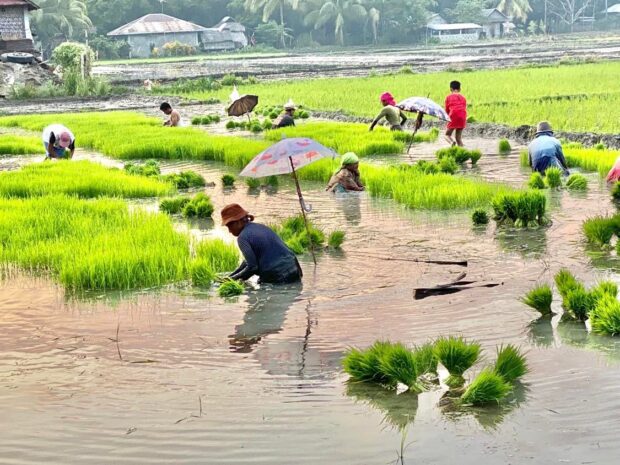Calamity state likely in Negros Occidental town if El Nino persists

DIFFERENT SITUATION The once-abundant rice fields in Negros Occidental, like this one in Cauayan town last year, are now suffering from the dry spell. RONNIE BALDONADO
BACOLOD CITY — A town of Negros Occidental may be placed under a state of calamity if the intense heat brought on by the El Niño phenomenon continues to damage crops.
Mayor John Rey Tabujara of Cauayan town on Friday, Feb. 16, said the dry spell has so far damaged mostly rainfed rice crops in 14 of 25 barangays.
It also affected 126 hectares of crops belonging to 127 farmers in the municipality.
“Some sugarcane crops and water for irrigation have also been affected,” he said.
READ: Pagasa: Drought may hit 24 provinces due to El Niño
Article continues after this advertisementThe Office of the Provincial Agriculturist placed the damage to rice crops in Cauayan at P7.6 million.
Article continues after this advertisementCauayan was the worst hit in Negros Occidental because of the dry spell with P7,699,980 in damage, followed by Hinoba-an – P2,525,595, Himamaylan City – P2,414,586, Sipalay City – 535,658, Binalbagan – P513,360, Moises Padilla – P450,897, and Isabela – P334,800.
Gov. Eugenio Jose Lacson, announced on Feb. 14 that the humid weather in the province had affected 383 farmers tilling 369 hectares in 43 barangays in seven local governments.
“We should be fortunate if the increment increase is just small,” he said.
READ:Bohol now under calamity state due to El Niño
Lacson spoke to Department of Agriculture (DA) regional director Dennis Arpia and gave the assurance that there would be cloud seeding in Negros Occidental.
“He will get back to me after consulting with his team with regards to cloud seeding. Hopefully, we can hear some good news next week,” Lacson said.
The DA earlier provided the plane and the province may provide the manpower and the materials.
“We will have to take advantage of the clouds that are present (for cloud seeding),” Lacson said.
READ: Drought hits Bataan, Zambales; crop losses in Negros at …
The provincial government, he said, would be using its savings to assist farmers affected by the dry spell as soon as a policy is set on who is entitled to receive aid.
The Philippine Atmospheric, Geophysical and Astronomical Services Administration Visayas had said that Negros Occidental, including Bacolod City, may experience a drought starting the end of February up to May.
Drought, it said, happens during three-consecutive months of way below normal rainfall condition or 60-percent reduction from average rainfall.
A drought could adversely affect different climate-sensitive sectors, including water resources, agriculture, energy, health, and public safety.
The bulk of the rice produced by Negros Occidental is on irrigated land.
READ: Davao Oriental put under state of calamity due to drought